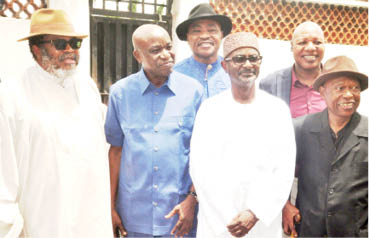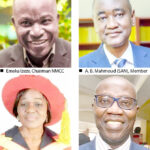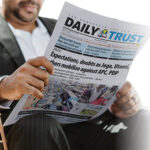The Nigerian Press Organisation (NPO) took a giant step to counter the government’s insistence on regulating the activities of newspapers in the country by launching the National Media Complaints Commission (NMCC).
The body is expected to receive and redress complaints by members of the public on infractions by any newspaper organization against them.
The NPO is made up of the Newspaper Proprietors Association of Nigeria (NPAN), Nigerian Guild of Editors (NGE); Nigerian Union of Journalists (NUJ); Broadcasting Organisation of Nigeria (BON) and Guild of Corporate Online Publishers (GOCOP).
Daily Trust reports that the NPO has been battling the government’s move to the Nigeria Press Council amendment bill which seeks to provide for tougher regulation on the activities of newspapers and sundry media organisations in the country. The amendment process is stalled as the case for its stoppage is before the Supreme Court.
- Still on interest rate, inflation and unemployment
- Politicians beware, your phone conversations aren’t safe!
However, media experts believe the move was in apparent realization by the NPO that over the years, public concern is mounting over the way some media organisations handle news.
This became more pronounced following the upsurge in online news outlets and a proliferation of mushroom news websites.
They believe that the broadcast media is being highly regulated with the establishment of the National Broadcasting Commission (NBC) which regulates the broadcasting industry in the country.
The NPO believes that if the media exist to hold the government accountable, subjecting them to government’s control would not only be counterproductive but injurious to the public given the tendencies of the ruling elite to suppress and bully the media to submission.
The unveiling of the commission came a few months after the media stakeholders converged on Lagos for a roundtable tagged, “Deepening Media Professionalism Through Co-Regulation” organised by NPAN in conjunction with the NGE, NUJ, BON, GOCOP and the Nigerian Bar Association (NBA).
Part of the outcome of the deliberation at the roundtable was the need to deepen professionalism in the media through having an ombudsman that would guide the conduct of practitioners.
Speaking at the launching of the commission, the President of NPO/NPAN, Malam Kabir Yusuf, declared that after some trial and error, “the Nigerian Press Organization, the umbrella body of owners, editors and reporters of print and online journalists in Nigeria, is taking the responsibility of regulating its work and conduct.”
Yusuf, who is the Chairman of Media Trust Group, explained that “in deference to the dictum, that journalism is too important to be left to journalists, we have opted for a mechanism of co-regulation, with the help of other actors in civil society, especially the bar and non-media NGOs.
“Radio and television are already regulated, some will say over-regulated. But print, which is the oldest and online, which is the newest, have escaped such control, the former warned by the lessons of history, and the latter, by the amplitude of technology.
“Powerful and privileged Nigerians, irritated by the nosiness of the media, often express the wish for some checks on its powers. I sometimes think that such people take freedom for granted, because it is there.
“I guess it is not the daily concern of the citizen, to worry about how the freedom we enjoy, were won and kept. The press exists to guard such liberties. But in the land of impunity, which Nigeria has become, our exertions merely annoy, rather than hinder, the powers that be.
“We have our own faults. Some journalists seem all out to prove that their pen is indeed a sword, for slaying real or imaginary enemies!
“The OMBUDSMAN will call such people to order. To appreciate that the power of the press should be used for good, not for self-aggrandizement to be effective, the physician has to heal himself, before he can apply the cure to others.”
To ensure that the commission performs its work effectively the membership has been extended to the bar, academia and the civil society.
Yusuf stated that the commission is expected to “serve as an independent forum for resolving complaints about the press quickly, fairly, and free of charge; maintain high standards of Nigerian journalism and journalists’ ethics; and defend the freedom of the press and the right of the people to know.
“We invite all stakeholders in the Nigerian project to support this initiative. The media is wary of government regulation, because politicians tend to have short-term goals. We are happy to submit to peer-regulation, by collaborating with civil society, business and the professions,” the NPAN president said.
The chairman of the commission, in his acceptance speech, was categorical that the Ombudsman was not meant to gag the press but to provide the platform for people to seek redress when offended by media contents. He also said media practitioners have not been fair enough in checking themselves.
He said, “What has happened lately is that we (media practitioners) haven’t also been very fair to ourselves in keeping ourselves in check. Our responsibility primarily is not to come and gag the press, we will not do that. We think that we have to be fair to ourselves. We must always do the right thing.
“So, when the public is complaining, instead of waiting for the people who do not understand what this job entails to begin to put us down and to insist on doing it in their way for their selfish reason, you will accept that an initiative such as this by the NPO, NPAN, NGE, NUJ and others, is something that is worth giving a shot.
“That is the only way we can keep our profession sane and keep it free of restrictions. People do not like their dirty stories being told in the public glare and there are too many dirty stories that have to be told particularly in our environment, to make progress.”
The NUJ President, Chris Isiguzo, explained that the stakeholders came up with the initiative in response to the persistent efforts by the National Assembly to introduce some forms of regulation to the media industry.
“We felt we have capacity as the stakeholders in the industry to regulate ourselves. What we have done is a co-regulation because it is not just the media professionals that are on the board; we have the Nigerian Bar Association (NBA), Civil Society Organisations (CSOs) and the Chairman, House of Representatives Committee on Information.
“Everybody has been brought on board to ensure that we look at the media and have an industry that works for the Nigerian people. This will bring confidence and trust to the media. It will also engender a high level of professionalism and help us build a stronger media profession in Nigeria,” he said.
In his reaction to the setting up of the commission, the Executive Secretary of the Nigerian Press Council, Mr Francis Nwosu, described the decision as “unfortunate”.
He said the NPO ought to tarry awhile given that the case is still pending before the Supreme Court.
He said the setting up of the commission was not in the interest of the profession, adding that the Ombudsman will be akin to the press being a judge in cases involving it.
He said it was wrong to say that government had any plan to muzzle the press as it has never interfered with the operation of any newspaper house or harassed any journalist.
Nwosu said the council was operating like any other regulatory agency which regulates the practice of a profession.
“The doctors, architects, lawyers and many other professions in the country have regulatory agencies regulating their various practices. So also the Nigerian Press Council,’’ he said.
Nwosu said the council was largely composed of journalists. “Ninety-nine per cent of the members are either practising or retired journalists.”
The nine-member commission is chaired by Mr Emeka Izeze, a former managing director, Guardian Newspaper.
Other members are Mr A. B. Mahmoud, SAN, former president of the Nigerian Bar Association (NBA); Prof Chinyere Stella Okunna, Deputy Vice Chancellor, (Academics) Paul University, Awka, Anambra State; Dr Hussain Abdu, a development specialist and country director, Care International (Nigeria); Mr Lanre Idowu, Editor-in-Chief, Diamond Publications Ltd. and Founder, Diamond Awards For Media Excellence (DAME); Mr Edetaen Ojo, Executive Director, Media Rights Agenda (MRA), Mrs Dupe Ajayi-Gbadebo, a journalist, lawyer and arbitrator; Mrs. Eugenia Abu, broadcaster, author, and columnist, and the Chairman, House of Representatives Committee on Information.

 Join Daily Trust WhatsApp Community For Quick Access To News and Happenings Around You.
Join Daily Trust WhatsApp Community For Quick Access To News and Happenings Around You.


